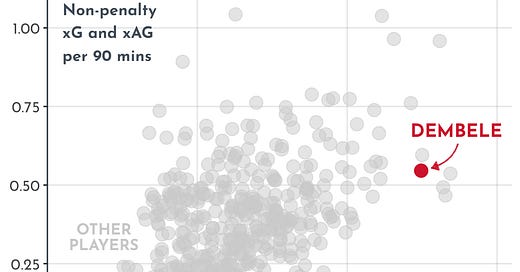Welcome to the 19th edition of Plot the Ball for 2023.
If you missed the previous edition, you can read it here:
A brief edition of the newsletter today, in response to an interesting transfer in men’s football which is apparently imminent: the sale of French winger Ousmane Dembélé from Barcelona to Paris Saint-Germain.
Ousmane Dembélé is 40% of a footballing superstar
You could make a case that one of the most underrated footballers playing in the men’s ‘Big Five’ leagues right now is Ousmane Dembélé.
To be fair, though, it’s only really possible to make that case when he’s on the field — rather than on the sidelines.
Dembélé’s production since joining Barcelona for an initial fee of €105mn ahead of the 2017-18 La Liga season is inarguable; he simply does many of the things which generate the most value on a football pitch very frequently.
Let’s revisit the metrics we used earlier in the year to look at Man City’s star duo, Kevin De Bruyne and Erling Haaland: the cumulative contribution of midfielders and forwards to their team’s progression of the ball up the field, and their contribution to the creation of goal-scoring opportunities through shots taken and shots assisted.
His aggregate performance since that first La Liga season — when he was aged just 20 — compares incredibly favourably to other elite wide players.
Dembélé has contributed 24.9 combined progressive carries, passes and receptions per 90 minutes played over the last six years — as well as 0.55 combined expected goals and expected assisted goals1.
Over this period, Vinícius Júnior recorded 25.0 progressive actions and 0.60 combined xG and xAG for Real Madrid; Jack Grealish recorded marks of 21.7 and 0.46 for Aston Villa and Man City; and Bukayo Saka recorded 18.6 and 0.42 for Arsenal2.
Another way of thinking about it is that the only players more involved than Dembélé both in their team’s ball progression and in their team’s shot creation are a pair of superstars: Vini Jr. and Neymar.
It’s also worth saying that — as one of the most capably two-footed players in world football — he’s just really fun to watch on the ball too.
But availability3 is also an essential quality for a top-level athlete to possess; excellence in professional sport, after all, is only attained by executing difficult skills again and again and again.
And Dembélé has played just 37% of Barcelona’s league minutes since he joined the Catalan club. According to the website TransferMarkt, across these six seasons he has had 12 separate stints on the sidelines due to injury which have lasted at least 14 days.
Having only turned 26 a few months ago, the French international should be hitting his peak just as he prepares to move back to his homeland.
It’s unlikely given his track record, but if Dembélé is able to stay healthy then PSG could soon have another star winger on their books — either to pair with Kylian Mbappé, or to try and replace him.
Substack has recently launched a subscriber referral scheme, which enables writers to offer additional benefits to readers who spread the word about their favourite publications.
If you enjoy this newsletter, please consider inviting a friend to read it too. By following these instructions, you will start to earn a number of additional rewards whenever they subscribe!
You can find the code for this piece on GitHub here
Some more detail on these metrics can be found in the piece on De Bruyne and Haaland, which you can read here.
On the topic of availability — and specifically the utility of minutes played as a statistic in isolation — this recent piece by is excellent.






